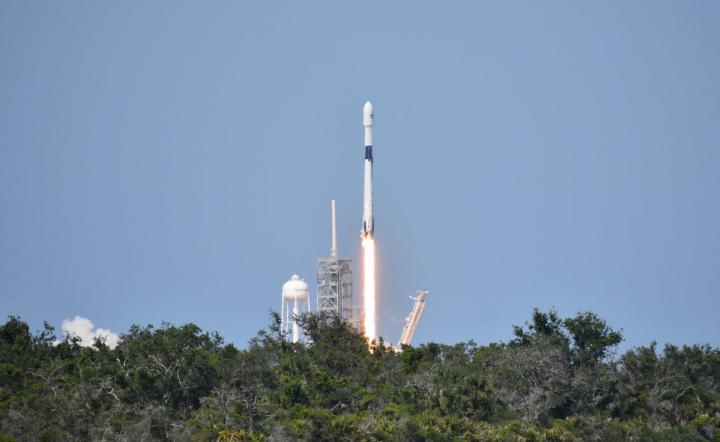So far many have weighed in the debate about whether Bangabandhu-1 (B-1), the first ever satellite owned by Bangladesh, is a financially viable project. While some sceptics have done their own maths to declare that even half of the invested money would not be recovered during the entire lifespan of the satellite, supporters called its launching a matter of national pride.
It’s still premature to say the project is doomed to failure, but it may not be an overstatement that the only party to be benefitted from the launch is the Beximco Group, our very own version of “Koch Brothers.”
The media, in general, regardless of political leanings, celebrated the launch as a major technological advancement, but the need for ensuring accountability in what can be called a dubious affair hasn’t been voiced.
The project cost $300 million, more than half of which was borrowed from HSBC, while the rest was taxpayers’ money. The government has created a new company that will operate the satellite. The man selected to head the company, however, is a bureaucrat who is less likely to have been trained to lead a commercial tech venture. This represents a major setback for a project that seeks to earn “a lot of” foreign currency.
We have so far been told that among the major clients of the satellite are Bangladeshi cable television channels and DTH (direct to home) companies. Bangladeshi cable TV channels are now spending $14 million a year to use satellites belonging to Singapore, China or India. However, Channel 71, a television channel known for its pro-government bias, has declared that the satellite’s Ku band, which accounts for 26 transponders among total 40, “is usually not used” by TV channels.
“Even a single drop of rain could interrupt transmission under Ku band,” Mozammel Babu, the channel’s managing editor and a top pro-government media figure, complained during an April meeting between the ICT ministry and the TV channel owners’ association.
Mr Babu has also some reservations about the satellite’s orbital position. “TV channels will have to maintain a 45-degree angle to connect to the satellite that will be challenging for us with the satellite placed in 119.1 degrees orbital slot as a six-storey building could be problematic,” he added.
The TV channel owners association’s reservations represent a serious threat to the financial prospect of the $300-million project.
In 2012, Bangladesh failed to secure its desirable orbital position in the face of resistance from 20 countries. Nonetheless, the government decided to go ahead with its plan, even if it meant doubling the initial cost—$150 million—and having an uncomfortable orbital slot, thus, a reduced financial prospect.
With TV channels now unlikely to use the satellite’s transponders, DTH service providers are now the only major clients. This is the phase when Beximco Group enters.
According to media reports, Beximco has obtained the exclusive rights to DTH business in Bangladesh. The process through which the license was sold was hardly transparent. This is an issue that is not currently covered by our media.
To put this in context, Pakistan in November 2016 sold DTH licenses to three companies in exchange for 14.69 billion rupees, but we do not know how much money has the government received from Beximco.
What is most astounding, however, is the fact that Beximco—a major client of the satellite’s transponders—has also been jointly awarded the rights to allocating signal frequency to other possible clients. This represents a major conflict of interest. This also confirms the fear of many: the group will enjoy an unequivocal monopoly.
No one, not even the chief of the country’s top tech regulator BTRC, seems to know through what process the company was awarded such rights. When asked, BTRC chairman had only this to say: “It was a decision of the information ministry. It’s a sensitive matter. I don’t have the right answer.”
A July 2012 report by the New Age (archived) also raised the possibility of wrongdoing in appointing the consulting firm of the project. While the media currently attributes the firm namely Space Partnership International (SPI) as “America-based,” one of its main men is Shafiq A Chaudari, a brother-in-law of Farid Khan, the younger brother of Faruq Khan, former minister and a powerful ruling party leader.
The Khan family business group, Summit Group, also a powerful pro-ruling party conglomerate, participated in the tender process on behalf of SPI. Before seizing the $10-million consultancy job, SPI had little experience in this field, according to the New Age report.
Apart from TV channels and DTH service providers, there have been talks to rope in international clients. However, experts have expressed scepticism since our neighbouring country India with 88 satellites, and China with 244, are better positioned to offer a competitive price.
Some could point out to the international coverage Bangladesh has received as a success. Unfortunately, however, all focus of the international media has been on SpaceX, the private space company that launched the satellite, owned by celebrity tech-billionaire Elon Musk.
Therefore, one should not be blamed for drawing the conclusion that the entire project might have been undertaken to benefit a particular business entity, which also happens to be a major donor of the ruling party. The only incentive for the ruling party in this project is the name of the satellite: Bangabandhu, the most important figure of the party.
Such a name is obviously a big political feat, and the hype in both traditional and social media is a bonus. In particular, many pro-government newspapers were so moved by the launch of the satellite that they made a big blunder on May 11 by declaring in the front-page lead story that the launch was done, while it was actually postponed.
True, having a satellite has its own benefits. The only problem, though, is that the price for the taxpayers for such a political display is too steep. By invoking Bangabandhu, a generally revered figure in Bangladesh, and in the name of national pride, a shady job worth $300 million has been done.











